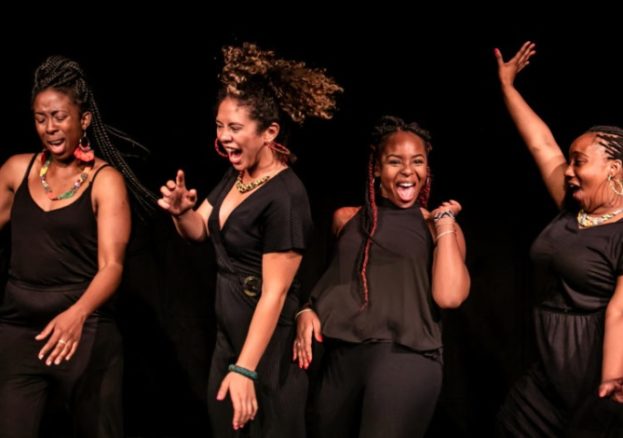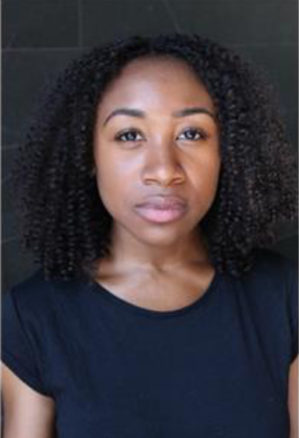
Written by Jessica L. Hagan and presented by creative movement Nouveau Riché and Omnibus Theatre. Following widespread critical acclaim and sold out audiences both at the Edinburgh Festival Fringe 2018 and in London, the play will be going on a 10 venue national tour this autumn from 26 September to 29 November 2019. Here, we catch up with director Jessica Kaliisa to hear more about this powerful and inspirational production.
How did you become involved in Queens of Sheba?
My journey with Queens of Sheba started from its inception after seeing one of Nouveau Riche’s earlier plays Timbuktu that looks at the lives of four black men. I approached Ryan – the writer and also the artistic director of Nouveau Riché with my dissertation material on Misogynoir – the term for the racism and sexism that women face simultaneously – and he agreed that a play should be formed for Black Women. We held focus groups with black women who gave us their raw and authentic experiences and writer Jessica Hagan wrote Queens of Sheba from it.

What did you learn from the focus groups?
That there is solidarity amongst us as black women and that our experiences unite us more than we think. The amount of women who’d had the same experiences was overwhelming; that we’d all had our hair touched by some stranger without permission, that we all feel compelled to censor ourselves at work, that’d we’d all been labelled aggressive at some point in our lives were just a few of the sad unanimous truths that every woman in the focus group had experienced. What I also found beautiful were the differences. That those who were of a darker complexion faced a different type of racism those who were fairer. Those who were physically bigger faced a different type of sexism to those who were physically smaller. Those who had kinkier hair faced different struggles to those who had a looser curl pattern. So I truly learnt that Misogynoir is a wide spectrum and that the we need to create something that honoured it all.
What does Queens Of Sheba mean to you?
Queens of Sheba is my safe space because it perfectly articulates the experiences and internal paranoia that I’ve failed to articulate for so long and gives me the confidence to know that it’ happens to all of us and we can find solidarity in this play. It tells a beautiful tone of sisterhood which we as black sisters need so much of to support one another and that’s why Queens of Sheba is so important to me and if black woman walk out of their feeling confident enough to know they are not and never were alone then I believe I’ve done my job.
Where you surprised by the play’s success at Edinburgh Fringe last year?
Yes and no. No because where ever we’d taken Queen of Sheba it had been a success. I’ve watched the play no less than 50 times now and it still makes me laugh tears of joy and cry tears of pain and relief. The play is so hilarious and incredibly written that it’s impossible to not at least acknowledge that is a fantastic play. What did surprise me at Edinburgh is the reception because Queens is so unapologetic. It makes anyone who is not a black women feel the pain, the guilt and the truth about how they make black women feel unintentionally or otherwise, and that makes people feel uncomfortable. I didn’t think that demographic of the Edinburgh Fringe would be so keen to have a mirror held up to them. But they were. And they loved it. And they thanked us for it.
What was it that inspired you to get on board as director?
Considering that I’d been involved with Queens from the beginning, it only felt natural for me to jump onboard as a director to continue to negate the process.
You haven’t come from a traditional directing route, explain?
No I am and have been a professional actress for about 10 years so this Queens is my directorial debut. My background in acting is what gives me the skills to direct.
What do you hope audiences will take away from seeing this play?
Change. It’s a big ask. But anyone who has a prejudiced mind against black women I want them to walk away with it changed. And for them to implement that change through life. And for them to change others mind sets because theirs has been changed until we get to a place where Queen’s is no longer relevant. Like I said, it’s a big ask and Queens is small ripple in a big ocean. Queens’ mission is just to show you who we really are – but I’d hope that the effect of that is change. And I’d like black women to walk away feeling uplifted, represented and understood.
This play embraces sisterhood, what does the term sisterhood mean to you?
I was asked this question a couple of days ago and if I think sisterhood and friendship are the same thing. I don’t, simply because I have friends who I wouldn’t call sisters and sisters who I wouldn’t call friends but then I have those who are both. Sisterhood to me means family. It means we’re connected from the same source because we were birthed the same birth and no matter what happens between us personally, whether we fight or whether we are friends or not, we’re still connected somehow by the same blood. I can meet another black woman on the other side of the world and call her sister and she will call me sister back because she knows exactly what I mean – we both come from the same place. And I think it’s something that we should continue to implement in the black community, because the world has tried to play us against each other for so long but we can stand against it in unity.
Queens of Sheba will run from 26 September – 29 November For booking details for all the venues please go to:
https://www.omnibus-clapham.org/queens-of-sheba-on-tour/
